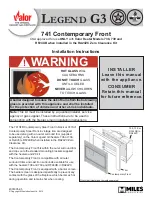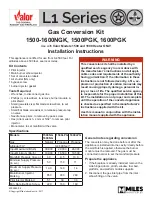
GB
39
POSSIBLE CAUSES OF OPERATIONAL INTERFERENCE AND
HOW TO RECTIFY THEM
SWEEPING
Sweeping the chimney ducts and chimney connections should be
carried out by a chimney sweep. The stove can be scraped down
and/or swept. A soot vacuum cleaner is most appropriate however.
If a chimney fire occurs or is suspected, the combustion damper
and the door must be closed. If necessary, contact the fire brigade
to extinguish it. The chimney must always be inspected by a
chimney sweep after a chimney fire.
WHEN THE STOVE IS NEW
When the stove is new, a particular smell may be detected, which
indicates an oil coating and excess paint on the panels.
After a number of fires the smell will disappear. A particular
lingering smell may occur after some use. The smell comes from
the insulation in the chimney. This can be relieved by burning wood
at 2.2 kg/hour for a period of 5-8 hours.
Abnormal amounts of soot form on the glass
There is always a certain amount of soot on the glass and this is added to
with each lighting. Soot on the glass is caused by three things:
• The wood is damp, which causes poor combustion and generates a lot of
smoke as a result.
• Too low temperature in the firebox, which causes incomplete
combustion and poor draft in the chimney.
• Incorrect procedure, the door was not in the lighting position for
approximately 15 minutes.
Check the moisture content of the wood, ensure that you have good base
embers and go through the lighting instructions once again.
Smoke odour around the stove for periods
This can occur when wind blows down the chimney and most often occurs
when the wind is from a particular direction. Another cause is the door was
opened when it is burning hard.
Painted parts have become discoloured
If painted parts have discoloured it is due to an excessive temperature
in the stove. The reason for the excessive temperature can be that the
maximum amount of wood has been used, inappropriate fuel has been used
(for example building waste, large quantities of finely chopped off cuts).
The warranty does not cover damage of this type.
If a problem occurs that you cannot rectify yourself, contact the dealer or
a chimney sweep.
We hope that these words of advice will help you to enjoy pleasant,
economic and problem free use of your Contura stove.
Poor draft in the stove after new installation
• Check the length of the chimney so that it meets NIBE’s
recommendations, that is a total length of at least 3.5 metres.
• Check that there is nothing in the chimney to restrict the smoke and
that no nearby buildings or trees affect the winds around the chimney.
• Check the area of the chimney (applies to existing stone built
chimneys), which should be 150-200 cm².
It is di∞ cult to light the fi re and the fi re dies
after a short time
• The wood may not be dry enough, check the wood.
• Another reason is that there may be negative pressure in the house,
for example when using a kitchen extractor fan or other mechanical
ventilation. Open a window near the stove before lighting the fire. Also
try lighting some newspaper and holding it up inside the stove to get
the draft going.
• The air supply duct from the outside may be completely or partially
blocked. Disconnect the hose and try lighting the fire with combustion
air from the room
• Perhaps the combustion air damper is not open.
• The smoke outlet of the stove may be blocked with soot, which can
occur after sweeping. Lift the smoke baffle out and check.
• Finally go through the lighting instructions again. Perhaps the amount
of kindling was too small and therefore the base embers were too weak
and cold to light the next load of wood.
• During operation, certain surfaces of the stove become very hot and can cause burn
injury if touched.
• Be aware of the strong heat radiated through the hatch glass.
• Placing flammable material closer than the safe distance indicated may cause a fire.
• Smouldering can cause quick gas ignition with the risk of damage to property and
personal injury.
• The ash-pan must be emptied when it is full. If this is not done, the air supply can
become blocked, resulting in poor function. In serious cases, ash can find its way out
through the damper.
• Modifications to the stove must not be carried out by unauthorised persons.
!


























